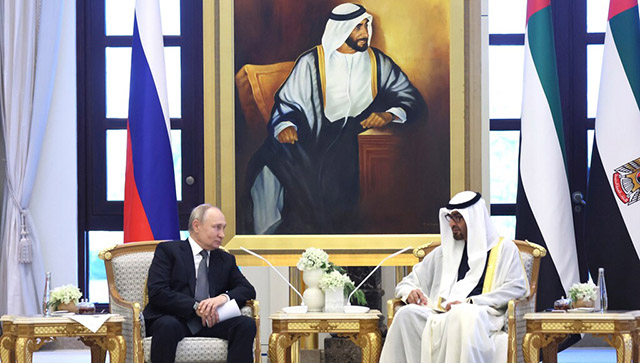Russian President Vladimir Putin’s recent visit to the United Arab Emirates and Saudi Arabia has sparked considerable interest and speculation, highlighting the complex dynamics between Russia, the West and the Middle East. While the West continues to view Putin as a formidable adversary, West Asia seems to perceive him as a valuable ally.
Diplomatic grandeur The visit included a ceremonial fly-past, a camel cavalry procession, a gun salute and an escort by four Russian jets, providing Putin with the full royal treatment. Despite Western efforts to isolate Putin, this visit underscored his enduring relevance as a geopolitical force. Putin’s close ties with the UAE and Saudi Arabia are deeply rooted in economic interests. As major players in the oil industry, Russia, Saudi Arabia and the UAE share synergies that extend beyond mere diplomatic relations. Following Russia’s invasion of Ukraine, these West Asian powers refused to align with the West’s call to exclude Russia from global energy markets. Notably, Saudi Arabia played a pivotal role in blocking such moves. For the UAE, it has become a critical partner for the Russian economy. Acting as a key hub, the UAE facilitates the trade of Russian oil, serves as a channel for financial transactions, and offers a strategic means to bypass Western sanctions. “Today, thanks to your position, our relations have reached an unprecedented high level. Indeed, the United Arab Emirates is Russia’s main trading partner in the Arab world,” said President Putin. Putin’s delegation and energy agenda Accompanying Putin on his visit were high-ranking officials, including the Russian Central Bank Chief, Deputy Prime Minister and Trade Minister. Notably, energy executives from Russia’s top energy companies were also part of the delegation. Their mission is clear: to stabilise falling oil prices, which have reached a near five-month low. This effort aligns with the objectives of OPEC Plus, a cartel that includes Russia and aims to influence global oil supply to bolster prices. While oil remains a top agenda item, Putin’s visit goes beyond economic considerations. The Russian president expressed a keen interest in discussing the Arab-Palestinian-Israeli conflict, particularly Israel’s actions against Hamas. “Of course, we will discuss with you the situation in the hottest spots, first of all, of course, in the Arab-Palestinian-Israeli conflict,” said President Putin. Russia’s deep ties with Hamas, exemplified by frequent delegations to Moscow, position Putin as a potential mediator in the conflict. Mediation question As Qatar has brokered previous ceasefires, attention now turns to whether Russia, despite its ongoing military engagements, could step in as a mediator. This prospect may be discussed in Putin’s upcoming meeting with Mohammed bin Salman, the Crown Prince of Saudi Arabia, where the agenda includes exploring ways to promote de-escalation in Gaza. As the world awaits the outcomes of Putin’s diplomatic manoeuvers in West Asia, it is clear that his visit signifies more than a routine diplomatic engagement. The intricate web of economic partnerships, energy alliances and potential mediation efforts in regional conflicts cements Putin’s role as a key player in shaping the geopolitical landscape of the Middle East. Views expressed in the above piece are personal and solely that of the author. They do not necessarily reflect Firstpost’s views. Read all the Latest News , Trending News , Cricket News , Bollywood News , India News and Entertainment News here. Follow us on Facebook, Twitter and Instagram.


)

)
)
)
)
)
)
)
)



